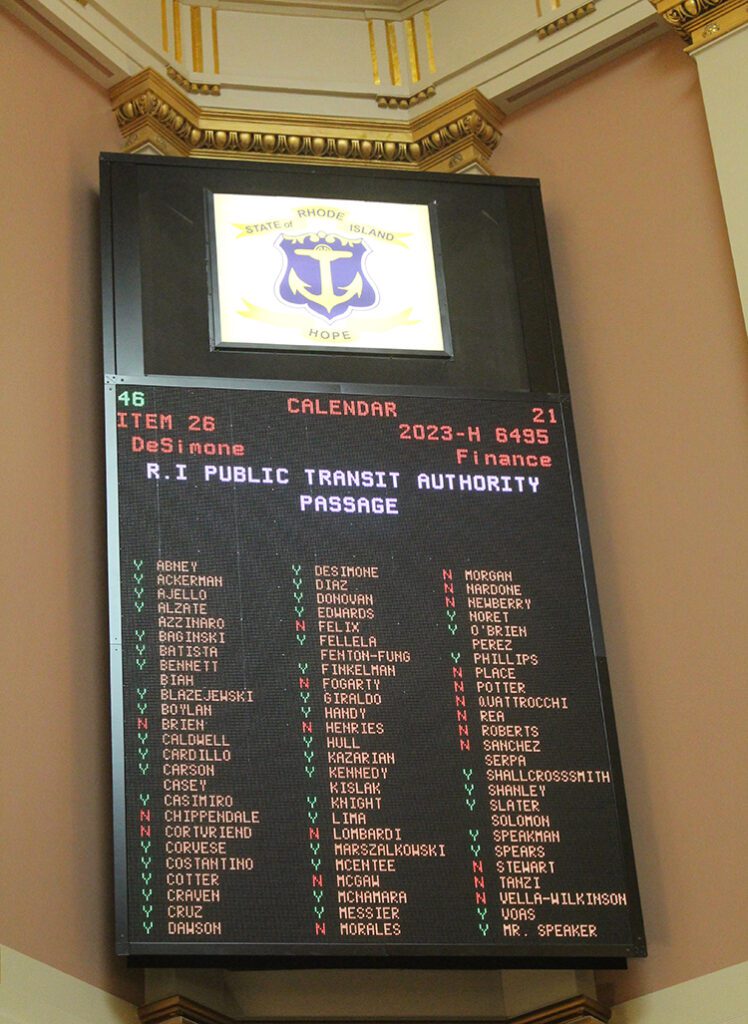General Assembly Approves Bill to Make RIDOT Director RIPTA’s Board Chair
June 14, 2023
PROVIDENCE — The General Assembly passed a bill Tuesday night that would mandate structural changes to the Rhode Island Public Transit Authority’s governing board, including making the director of the Department of Transportation its chair.
The House passed its bill (H6495) June 13, 46-21; the Senate approved its version earlier this month.

In addition to installing the RIDOT director as RIPTA board chair, the bill, if signed, would increase the number of members from eight to nine and the quorum from four members to five.
The bill also states, “The governor shall achieve a diverse membership in the board and shall give due consideration to recommendations for nominations” from an assortment of Rhode Island groups, including the Amalgamated Transit Union.
Transit advocates had testified and held rallies against the bill because of the installment of RIDOT director as chair.
An initial version of the bill had called for RIPTA to become a part of RIDOT, which would have put RIDOT director Peter Alviti in charge of the agency, but that was scaled back last month to the current version.
Barry Schiller, a longtime transit advocate who sat on RIPTA’s board from 1995-99, told ecoRI News he supported increasing oversight of RIPTA but didn’t believe the requirement to place a RIDOT director in that position was the best way to accomplish that.
“The chair, in my opinion, should be someone whose government responsibility is primarily about transit,” Schiller said. “RIDOT is an intrinsically highway-oriented agency. I mean, just look at the amount of money that’s spent on highways. Transit would be like an afterthought.”
The chair also has important procedural power, running meetings and influencing the agenda.
“Most things are routine, and most of the time it will make no difference at all. But when there’s an occasional issue that comes up,” Schiller mentioned policy surrounding fares, state funding, and federal spending priorities. “Those are important things, and the chair would have a lot to do with setting the agenda and moving it along.”
Schiller also noted the RIDOT director already has many responsibilities and adding chairmanship of the RIPTA board to the list is ill-advised. In testimony before the House Finance Committee last week, Schiller commented on the number of recent meeting absences by Alviti.
Alviti has missed 14 of the last 28 meetings, according to meeting minutes going back to January 2021. Alviti could not be reached for comment.
Still, Schiller said there were ways the bill and other changes to the board could make RIPTA better. The possibility of having a union representative who knows the ins and outs of the authority’s operation could prove helpful, he said.
Schiller also noted that when he was on the board there was an accounting specialist, which was an advantage when trying to understand complicated budget issues.
He also agrees with current board member Patrick Crowley, who supported the bill in its entirety, that the body needs better oversight.
Crowley told ecoRI News that installing the RIDOT director as chair “provides a better oversight than the status quo.”
RIPTA board members have “made some decisions, or not made decisions in some cases, to let the agency drive the agenda for public transportation in the state when it should be the board that is driving that agenda,” Crowley said.
He also said carrying out the state’s plans for public transit will require the collaboration of RIPTA and RIDOT to work on the system “writ large.”
“Having the two agencies completely siloed, it makes it harder, in my opinion, to accomplish the goals of the Transit Master Plan,” Crowley said.
Crowley said he couldn’t speak to Alviti’s frequent absences but did say that other members also miss meetings and that the board should discuss ways to make attending for the mostly volunteer group more feasible.
To those who didn’t support the passage of the bill, Crowley noted change is hard and sometimes messy.
“The status quo is clearly not working, so we’ve got to try something different,” he said. “If this doesn’t work, we’ll try something again in the future. That’s the beauty of having a democratic system.”
With the passage of bills in both the Senate and the House, the bill still needs to be signed before it becomes law.
If the bill is signed by the governor, it would take effect July 1.




thanks for covering this issue. It is important to the environment community that RIPTA do much more to live up to its potential to lower carbon emissions, shape better land use by helping revitalize city and town centers, have safer travel, and keep more of our energy $$ in the state, but its hard to see that the current DOT Director helping do that considering past actions.
As of 6/20/23, RI Transit Riders is urging the Gov to veto the bills S991A, H6495, if you agree we would appreciate calling the Gov’s Office 222-2080 and ask for the veto.